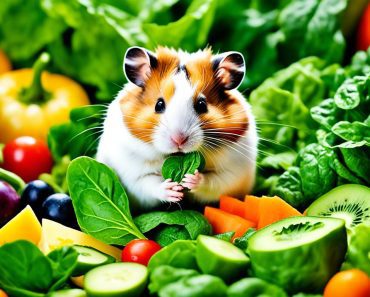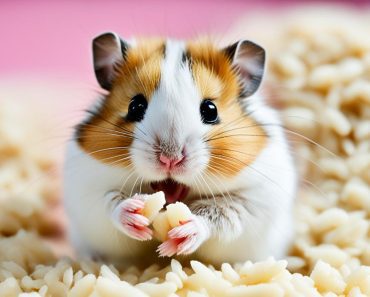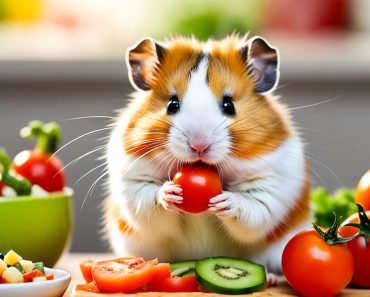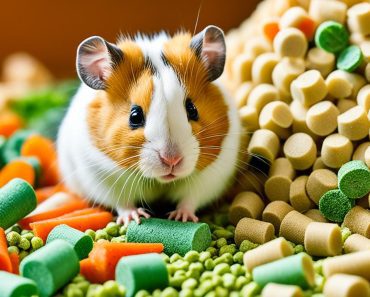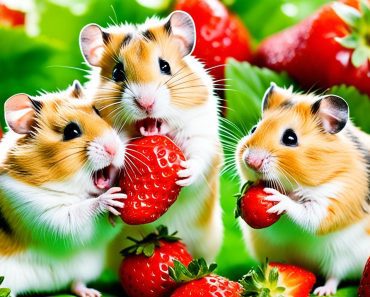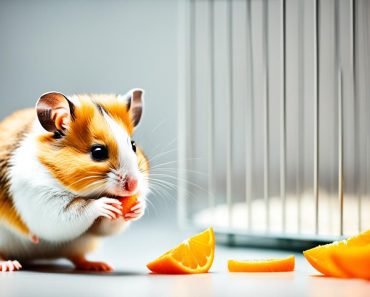Hello, fellow hamster lovers! If you’re wondering whether hamsters can enjoy pears as a snack, you’ve come to the right place. As an avid hamster enthusiast, I understand how important it is to provide our furry friends with a balanced and nutritious diet.
In this article, I will delve into the topic of hamsters and pears, discussing the safety of this fruit as a treat, portion sizes, nutritional benefits, and more. So, let’s dive in and explore the world of hamsters and pears together!
Can Hamsters Eat Pears? Yes, they can, in moderation.
- Hamsters can enjoy pears in small, controlled portions as part of a balanced diet.
- Pears provide important nutrients such as vitamin C, potassium, and dietary fiber.
- Monitor your hamster for any adverse reactions and remove any leftover pear to prevent rotting.
- Avoid offering overly ripe pears, as they have higher sugar content.
- Moderation is key when feeding treats to hamsters, including pears.
Best Treats to Feed Hamsters
Hamsters can enjoy a variety of treats as part of their diet. These treats not only add variety to their meals but also provide essential nutrients for their overall health and well-being. When it comes to treats, fruits are a popular choice for hamster owners. They are not only delicious but also packed with vitamins and minerals. One fruit that hamsters can safely enjoy is pears.
Pears are a healthy snack option for hamsters. They are rich in important nutrients such as vitamin C, potassium, and dietary fiber. These nutrients are essential for supporting hamsters’ immune system, digestion, and overall vitality. Pears are also low in calories, making them an ideal choice for hamsters who are watching their weight.
When feeding pears to your hamster, it’s important to remember that moderation is key. Offer them a very small piece of pear to avoid overfeeding. Monitor your hamster for any signs of an upset stomach, such as diarrhea, which may indicate intolerance or sensitivity to pears. As with any new food, it’s always best to introduce it gradually to your hamster to ensure they can tolerate it well.
It’s worth noting that pears can also be given to small critters other than hamsters, such as mice and gerbils, as a healthy snack option. The nutritional benefits of pears make them a great addition to their diet as well.
Pears are a healthy and tasty treat option for hamsters and other small critters. Their nutritional value and low-calorie content make them a favorable choice. Just remember to offer them in moderation and monitor your furry friend for any adverse reactions.
What Not to Feed Your Hamster
While giving treats to your hamster can be a great way to show them love and affection, it’s important to be aware of the foods that should be avoided. Some foods can be harmful to their health and should not be included in their diet. Here are some foods that you should avoid feeding your hamster:
- Onions and garlic
- Apple seeds
- Raw potatoes
- Chocolate
- Raw beans
- Citrus fruit
- Rhubarb leaves or raw rhubarb
- Sugary foods
- Salty foods
- Junk food
- Caffeine
- Alcohol
These foods can be harmful to hamsters and should not be given to them. Onions and garlic contain compounds that can damage your hamster’s red blood cells, while apple seeds contain trace amounts of cyanide. Raw potatoes, chocolate, and raw beans contain toxins that can cause digestive upset and other health issues in hamsters. Citrus fruits, rhubarb, sugary foods, salty foods, junk food, caffeine, and alcohol are also unsuitable for their delicate digestive systems.
By avoiding these foods, you can help ensure that your hamster stays healthy and happy. It’s vital to provide them with a balanced and nutritious diet that meets their specific dietary needs. If you have any doubts or questions about what to feed your hamster, consult with a veterinarian who specializes in small animals.
Importance of a Balanced Diet for Hamsters
Hamsters require a balanced and nutrient-packed diet to maintain their health. While treats like pears can be enjoyed in moderation, it’s essential to provide a diet that meets their nutritional needs. Hamsters need a combination of commercial diets, fresh vegetables, and occasional treats to ensure they receive all the necessary vitamins, minerals, and fiber for optimal health.
A balanced diet for hamsters includes specially formulated commercial diets that are rich in protein and fat. These diets are designed to meet the unique nutritional requirements of hamsters and provide them with the necessary energy and nutrients to thrive. It’s important to choose high-quality commercial diets that are specifically made for hamsters and avoid using diets formulated for other small animals.
In addition to commercial diets, fresh vegetables should be included in a hamster’s daily diet. Vegetables like leafy greens, carrots, and bell peppers are great choices as they are packed with vitamins and minerals. It’s important to introduce vegetables gradually and monitor your hamster for any digestive issues. Offering a variety of vegetables will ensure your hamster receives a wide range of nutrients.
Occasional treats, such as pears, can be given to hamsters in small amounts. These treats provide a source of mental stimulation and can be used as rewards during training. However, it’s crucial to limit the intake of treats and maintain portion control to prevent any adverse health effects. Too many treats can lead to obesity and other health issues.
Providing a balanced diet that meets the nutritional needs of hamsters is key to their overall well-being. It ensures they receive all the essential nutrients they need to thrive and stay healthy. By offering a combination of commercial diets, fresh vegetables, and occasional treats, you can provide your hamster with a varied and nutritious diet that supports their growth and vitality.
Pears Nutrition Facts for Hamsters
Pears are not only a delicious fruit, but they also offer several nutritional benefits for your hamster. These small and furry pets can benefit from the essential nutrients found in pears, including vitamin A, potassium, vitamin C, manganese, zinc, and vitamin K. These nutrients play a vital role in maintaining your hamster’s overall health and well-being.
One of the advantages of feeding pears to your hamster is their low-calorie content. This makes them a suitable addition to their diet without causing weight gain or health issues. Additionally, pears are a great source of dietary fiber, which helps support healthy digestion in your hamster.
However, it’s crucial to keep in mind the sugar content of pears. Hamsters have a limited ability to metabolize sugar, and high levels can be harmful to their health. Therefore, it’s important to offer pears in small, bite-sized portions to prevent any adverse effects on your hamster’s well-being.
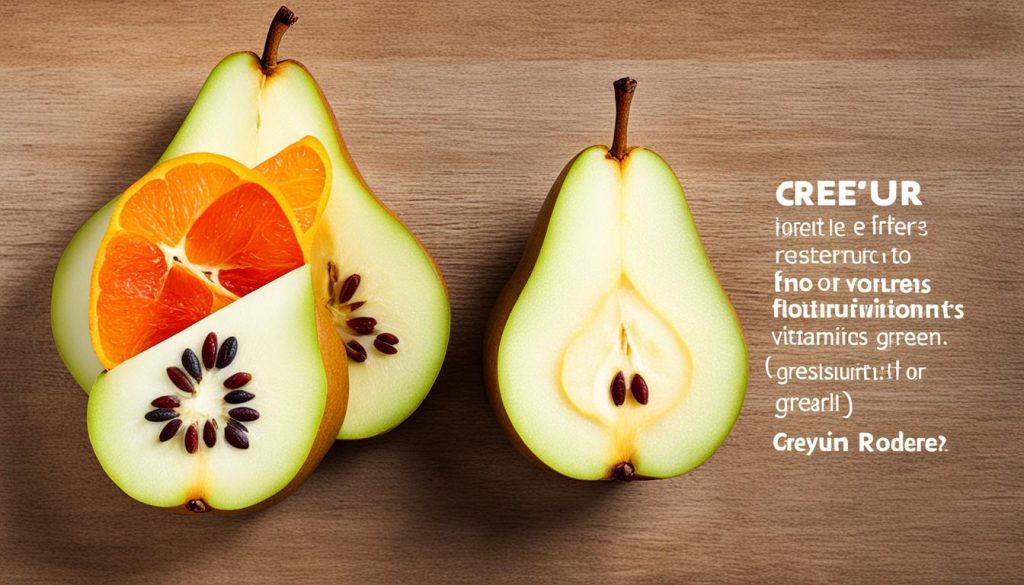
Choosing and Serving Pears for Hamsters
When it comes to serving pears to hamsters, it’s important to consider their ripeness. Opt for crisp and firm pears rather than overly ripe ones, as they have a higher sugar content that can be harmful to hamsters. Serving pears in small, bite-sized portions is essential to avoid overfeeding and monitor your hamster for any negative reactions.
Remember to promptly remove any leftovers from the cage to prevent rotting and maintain cleanliness. This will ensure that your hamster’s treats remain fresh and appetizing.
If you’re unsure about the ripeness of a pear, consult a veterinarian or do some research to determine the ideal stage of ripeness for hamsters. By selecting the right pears and serving them in appropriate portions, you can provide your hamster with a safe and enjoyable treat.
Moderation and Portion Control for Hamsters
Moderation is key when it comes to feeding treats to your furry friend. This applies to pears and any other treat you offer to your hamster. It’s important to start with small amounts and gradually increase based on your hamster’s tolerance and overall health.
Hamsters have delicate digestive systems, and offering them too much pear or any other treat can lead to gastrointestinal upset or other health issues. Therefore, it’s crucial to practice portion control and monitor your hamster’s behavior after introducing a new treat or increasing the quantity.
Consulting with a veterinarian who specializes in small animals, such as hamsters, can provide valuable guidance on portion sizes and any specific dietary needs your hamster may have. They can help you create a balanced and healthy diet plan that incorporates treats like pears while meeting all the nutritional requirements of your hamster.
By maintaining moderation and portion control, you can ensure that your hamster receives a well-rounded and balanced diet. This includes a mix of commercial diets, fresh vegetables, and occasional treats, like small portions of ripe pears.
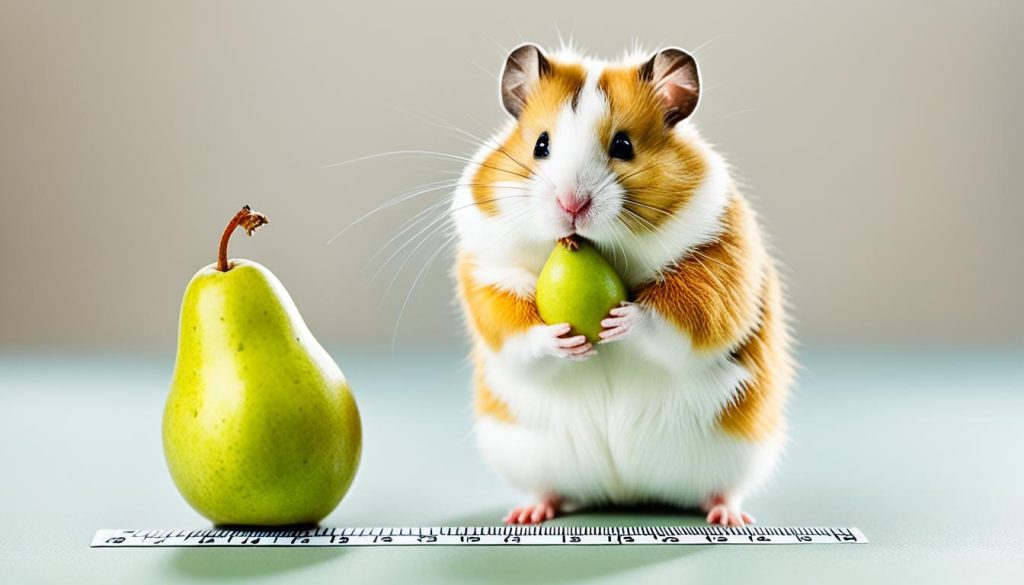
Conclusion
Hamsters can safely enjoy pears as a part of their diet. However, it’s important to offer them in small and controlled portions due to the high sugar content. Pears provide essential nutrients for hamsters, but moderation is key to maintaining their overall health and well-being.
To ensure a balanced diet, it is crucial to include commercial hamster food that meets their nutritional requirements, fresh vegetables, and occasional treats like pears. By providing a varied and nutritious diet, you can promote optimal hamster nutrition and support their overall health.
Remember, when offering pears to your hamster, choose ripe and firm ones rather than overly ripe ones to avoid excessive sugar intake. Cut the pears into small, bite-sized pieces and closely monitor your hamster for any adverse reactions or digestive issues.
By following these guidelines and providing your hamster with a well-balanced diet, you can keep them happy, healthy, and thriving. Remember, the key to hamster nutrition is not only about what they can eat but also about offering safe treats in moderation.

